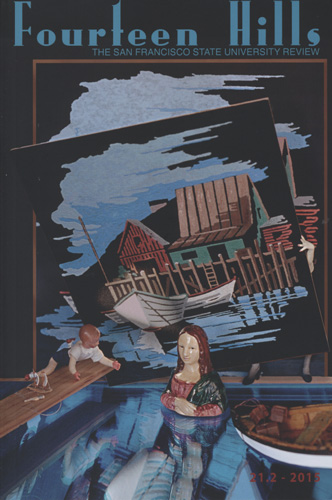Fourteen Hills – 2015
“Scottie as The Captain covers her head with her dress, flips the table over, jumps in and rows desperately.” You’ve just read stage directions for “Excerpt from Scottie Doesn’t Play,” a one-act play by Da’Shay Portis in the literary magazine Fourteen Hills – proof that this thick volume is packed with diverse experimental, progressive and cross-genre writings and images. “Scottie as The Captain covers her head with her dress, flips the table over, jumps in and rows desperately.” You’ve just read stage directions for “Excerpt from Scottie Doesn’t Play,” a one-act play by Da’Shay Portis in the literary magazine Fourteen Hills – proof that this thick volume is packed with diverse experimental, progressive and cross-genre writings and images.
Let’s start with poetry. Few of the poems are standard form, several are prose poems, and many fall into other configurations. For example, “Fruits or When Feeding,” by Nora Toomey begins:
was sober then
reinforced by newspaper
had a clarinet
black harmony collapsed
by the jade tree
E. Kristin Anderson states that her poem “Dragon Supplies, Break the Windows” is a found poem, one in which lines are picked from various sources and meshed together to create a poem:
I.
They preferred to scan for helicopters;
my heart’s turning to ashes.
[ . . . ]
III.
Shells, coral adorn shelves, side by side
stormy weather is for Friday.
She even lists her source: the Austin American-Statesman newspaper. Which makes me wonder if several of the other poets may have followed this technique or something akin to it. A special feature in this issue is a poem by and interview with Scottish writer Sylvia Telfer who won the 2015 Stacy Doris Memorial Poetry Award. Stacy Doris was associate professor in San Francisco’s Department of Creative Writing (the publisher of this journal). Telfer’s winning entry “The Bronze Grass of Isa Bell” is an inventive poem that addresses the vulnerability of women in general and three women in particular. It begins: “By a blue eye pool in Qatar, ‘the unholy / trio’, in club plush, far-off bleat of goat / fuss, the hub on ‘us’.” And ends with:
We’re still ‘the unholy trio’,
Isa Bell, Candi Jamieson and I
when reality’s a blue eye of pool
on tarmac, storm over corn, a pallid
moon fallen to earth and hell,
is the bronze grass born of Isa Bell.
Telfer tells in the interview about her creative practice “Only rarely do I have an idea at the outset of where a poem is going, but, in this poem, I did on an emotional level. I then just let the images grow themselves,” which readers may be able to pick up on when reading the whole piece.
Among the short fictions, “Excerpt from Be Tiger Virgin” by JJ Chen Henderson, about a young girl in China being quizzed on her English by an American, is sweet and funny and ingenious. The American professor asks her why she wants to be in a particular class, to which she contemplates before answering, “I conjure up an answer. ‘Because it’s the best class with the best teachers.’ I would be a fool to tell him that my real reason is to go to America, let alone my obsession with Hollywood and my desire to eat steaks.”
Several other works involve young people as subjects, as in the poem “This Is Just an Experiment” by Janet McNally: “They let us girls start fires / in beakers, flinting matches / against our gray flannel skirts.” In “Traces of Gabriel Gallaghar Among the Moons of Jupiter,” a long form poem by Lynda Sexson, a woman named Rachel, who has fallen face first on ice, summons 3rd grade and her first love. Luke Dani Blue tells a story from the perspective of two girls waiting for the end of the world in “Destroyed Flowers Everywhere.” And “Cops and Families: excerpt from Art in Heaven [an autobiographical puppet show]” by Anna Joy Springer has young Lulu observing, “Mom and Mack are nudists so they’re naked all the time, which is both natural and disgusting.”
Among other unique forms to enjoy in this issue, two stories are expressed in a series of communications: Rob Halpern’s “Correspondences from Common Place” and Gabriel Houck’s “Missed Connections.” Houck’s missives from seemingly disconnected sources may puzzle the reader before producing an aha moment.
And back to “Excerpt from Scottie Doesn’t Play,” Portis classifies this as a “trauma play. It’s an experimental, language-driven play about the body and the psyche.” Her cast of characters takes on various personas in a bold way. There’s rape, music from Sound of Music, a Hail Mary (the prayer, not the football pass), and a character whose name might offend certain people.
Perfectly complementing the printed words in this volume are the cover photo by Stephen Albair and eight intense photos and mixed media works by various artists. Some artwork is surrealistic, some less so, but all invite close study.
Indeed, Fourteen Hills contains a whopping variety of material to keep a reader busy until the next issue is published. It’s not a quick read. Prepare to spend time going over these pieces. For the patient reader, it’s time well spent.
[www.14hills.net]





